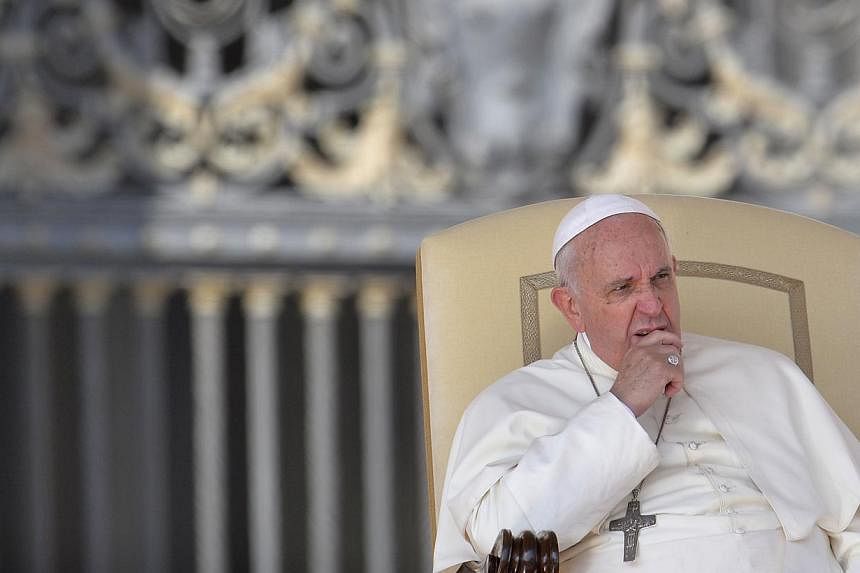A report from the Vatican on Monday has broadly called on Catholics to be more accepting of gay people, even though the church does not condone gay unions or gay marriage.
It also called on the church to welcome and accept unmarried couples and those who have divorced, as well as the children of these less traditional families.
The working document is a starting point for discussion, and it has to be discussed and rewritten in the next week by bishops who will scrutinise each section.
Here is why the report, which prominent Vatican expert John Thavis described as "a pastoral earthquake", may be significant:
1. What did the report say?
The 12-page report, issued after the first half of a synod - or an assembly - called by Pope Francis, used less judgmental and more compassionate language than that seen in Vatican statements prior to the 2013 election of the Pope.
An excerpt said: "Homosexuals have gifts and qualities to offer the Christian community: are we capable of welcoming these people, guaranteeing to them a further space in our communities? Often they wish to encounter a Church that offers them a welcoming home.
"Are our communities capable of proving that, accepting and valuing their sexual orientation, without compromising Catholic doctrine on the family and matrimony?"
The document, in a non-judgmental tone, talks about the challenges people face in their quest for happiness, including living together and divorce.
Archbishop Bruno Forte, the synod's special secretary, said in a news conference afterwards that while the church does not condone gay unions or gay marriage, it must "respect the dignity of every person".
"The fundamental idea is the centrality of the person independently of sexual orientation," he said.
2. Did the report say anything else?
The document nevertheless affirmed that relationships conforming to traditional Catholic teachings are the "ideal".
It also slammed the United Nations and some Western countries for supplying financial aid to countries on condition that they scrap anti-gay laws, decrying the way "that international bodies make financial aid dependent on the introduction of regulations inspired by gender ideology".
But it also urged the Church to address "real-world problems", like caring for "wounded families" and understand the helplessness of situations like divorce.
On those who marry outside the church or have families outside of marriage, it said a "new dimension of today's family pastoral consists of accepting the reality of civil marriage and also cohabitation" and "in such unions, it is possible to grasp authentic family values or at least the wish for them. Pastoral accompaniment should always start from these positive aspects".
3. What has the Church said before this?
Traditional Catholic preaching has said that gay couples are "living in sin".
Pope Benedict XVI said a homosexual inclination is a "strong tendency ordered to an intrinsic moral evil" and an "objective disorder", in a document written when he was still Cardinal Joseph Ratzinger and head of the Vatican's doctrinal department.
But Pope Francis, after assuming the role, has taken a more compassionate tone towards gay people, saying last year: "If a person is gay and seeks God and has goodwill, who am I to judge?"
4. What do Vatican watchers say?
Reverend Jim Martin, a priest and writer for the Catholic journal America, called the document "extraordinary" and "revolutionary" as it was the first time the Vatican has used the term "partners" and mentioned mutual care that people give each other. It also praises the contributions of gays and lesbians to the church.
Professor Patrick Hornbeck, chairman of the theology department at Fordham, a Catholic university in New York, said the document shows that the Church is intent on understanding how people really live their lives.
5. What do gay rights groups say?
New Ways Ministry, a United States Catholic gay rights group, called it a "major step forward", and without the "major gloom and doom and apocalyptic horror" of past Vatican pronouncements on homosexuals.
London-based Catholic gay rights group Quest said it was "a breakthrough in that they acknowledge that such unions have an intrinsic goodness and constitute a valuable contribution to wider society and the common good".
6. What do critics say?
Mr John Smeaton, co-founder of the conservative group Voice of the Family, said: "Those who are controlling the synod have betrayed Catholic parents worldwide, calling it "one of the worst official documents drafted in Church history".
Voice of the Family, a global Catholic coalition, called the document a betrayal. "Why not give Communion to polygamists if we give it to divorced and remarried?" the group asked.
7. Is this report binding in any way?
The document is a starting point for discussion. The report has to be discussed and rewritten in the next week by bishops who will scrutinise each section. A final report will be issued after that to be disseminated and discussed worldwide over the next year.
There will be a second round of discussions in Rome in October next year, where pastoral changes might be proposed.
Pope Francis will ultimately decide the course of action after all the discussions are done.
Sources: Reuters, New York Times, Washington Post

